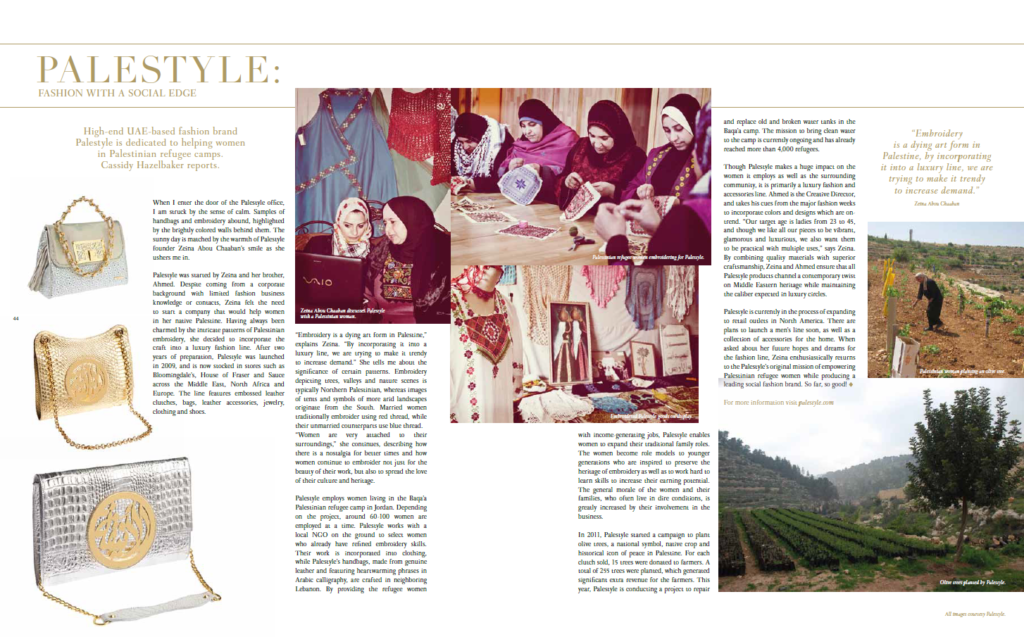Palestyle: Fashion with a Social Edge

High-end UAE-based fashion brand Palestyle is dedicated to helping women in Palestinian refugee camps. Cassidy Hazelbaker reports.
When I enter the door of the Palestyle office, I am struck by the sense of calm. Samples of handbags and embroidery abound, highlighted by the brightly colored walls behind them. The sunny day is matched by the warmth of Palestyle founder Zeina Abou Chaaban’s smile as she ushers me in.
Palestyle was started by Zeina and her brother, Ahmed. Despite coming from a corporate background with limited fashion business knowledge or contacts, Zeina felt the need to start a company that would help women in her native Palestine. Having always been charmed by the intricate patterns of Palestinian embroidery, she decided to incorporate the craft into a luxury fashion line. After two years of preparation, Palestyle was launched in 2009, and is now stocked in stores such as Bloomingdale’s, House of Fraser and Sauce across the Middle East, North Africa and Europe. The line features embossed leather clutches, bags, leather accessories, jewelry, clothing and shoes.
“Embroidery is a dying art form in Palestine,” explains Zeina. “By incorporating it into a luxury line, we are trying to make it trendy to increase demand.” She tells me about the significance of certain patterns. Embroidery depicting trees, valleys and nature scenes is typically Northern Palestinian, whereas images
of tents and symbols of more arid landscapes originate from the South. Married women traditionally embroider using red thread, while their unmarried counterparts use blue thread. “Women are very attached to their surroundings,” she continues, describing how there is a nostalgia for better times and how women continue to embroider not just for the beauty of their work, but also to spread the love of their culture and heritage.
Palestyle employs women living in the Baqa’a Palestinian refugee camp in Jordan. Depending on the project, around 60-100 women are employed at a time. Palestyle works with a local NGO on the ground to select women who already have refined embroidery skills. Their work is incorporated into clothing, while Palestyle’s handbags, made from genuine leather and featuring heartwarming phrases in Arabic calligraphy, are crafted in neighboring Lebanon. By providing the refugee women with income-generating jobs, Palestyle enables women to expand their traditional family roles. The women become role models to younger generations who are inspired to preserve the heritage of embroidery as well as to work hard to learn skills to increase their earning potential. The general morale of the women and their families, who often live in dire conditions, is greatly increased by their involvement in the business.
In 2011, Palestyle started a campaign to plant olive trees, a national symbol, native crop and historical icon of peace in Palestine. For each clutch sold, 15 trees were donated to farmers. A total of 255 trees were planted, which generated significant extra revenue for the farmers. This year, Palestyle is conducting a project to repair and replace old and broken water tanks in the Baqa’a camp. The mission to bring clean water to the camp is currently ongoing and has already reached more than 4,000 refugees.
Though Palestyle makes a huge impact on the women it employs as well as the surrounding community, it is primarily a luxury fashion and accessories line. Ahmed is the Creative Director, and takes his cues from the major fashion weeks to incorporate colors and designs which are on-trend. “Our target age is ladies from 23 to 45, and though we like all our pieces to be vibrant, glamorous and luxurious, we also want them to be practical with multiple uses,” says Zeina. By combining quality materials with superior craftsmanship, Zeina and Ahmed ensure that all Palestyle products channel a contemporary twist on Middle Eastern heritage while maintaining the caliber expected in luxury circles.
Palestyle is currently in the process of expanding to retail outlets in North America. There are plans to launch a men’s line soon, as well as a collection of accessories for the home. When asked about her future hopes and dreams for the fashion line, Zeina enthusiastically returns to the Palestyle’s original mission of empowering Palestinian refugee women while producing a leading social fashion brand. So far, so good!